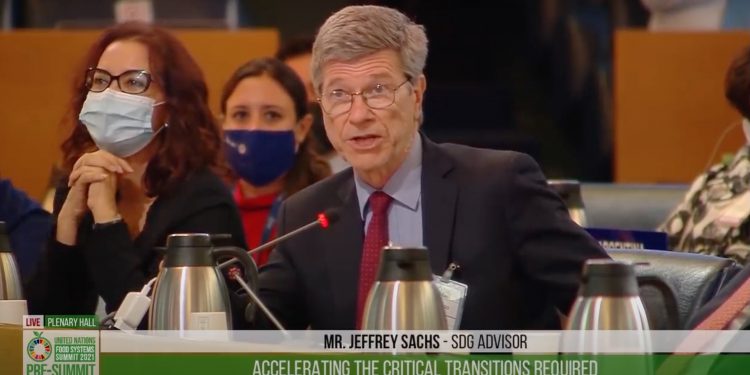The world food system is based on large multinational companies, private profits, and a very low measure of international transfers to help the poor, American economist Jeffrey Sachs, of Columbia University, told the United Nations Food Systems Pre-Summit last week.
He said the UN must be a core and central institution, “Because this is the only way we’re going to have a civilised world.” However, it needs to funded properly, he said.
“It cannot be that the whole UN budget is less than my neighborhood’s budget in New York. The UN core budget this year is $3 billion. New York City’s budget is $100 billion. And then we say, Why don’t things work well? Because the rich are hoarding everything.”
In video
- Jeffrey Sachs addresses the United Nations Food Systems Pre-Summit.
Jeffrey Sachs said the current food system is “based on extreme irresponsibility of powerful countries with regard to the environment. It’s based on a radical denial of the rights of poor people.
“We ask the minister of DRC, (Democratic Republic of the Congo) what’s wrong with your country? We don’t even start by saying the King of Belgium created a slave colony for 30 years, the government of Belgium ran the slave colony for another 40 years, the CIA assassinated your first popular leader and installed another dictatorship for the next 30 years. And now Glencore and others suck out your cobalt without giving you tax income.
“We don’t reflect on that, we say, why don’t you govern properly?
“The private sector’s not going to solve this problem”
“We have a system but we need a different system. We cannot turn this over to the private sector, we already did, about 100 years ago. To the private sector, with the US military behind it.
“With the defence of property rights in the Minister of Honduras’s country where United Fruit can the country for a long time and their attorney was the Foreign Secretary of the United States and his brother was the head of the CIA…
“So we have a system but we have to have a new system based on principles of human dignity in the Universal Declaration. Principles of sovereignty, principles of economic rights, because in 1948 all the governments said food is a right, social protection is a right, not a nice thing, a right. That was 73 years ago.
“The private sector’s not going to solve this problem… I come from a country that not only doesn’t care about the world’s poor. It doesn’t even care about its own poor. One in seven Americans is hungry right now.”
Solutions included inviting the African Union to join the G20, adding 1.4 billion people “who are not at the table for finance right now.
“We need an order of magnitude change for development finance… Poor countries cannot borrow. That’s what we should have heard from the World Bank. I didn’t hear that from the World Bank.”























